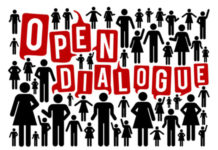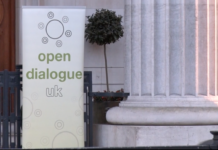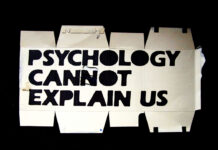“Veterans Let Slip the Masks of War: Can This Art Therapy Ease PTSD?”
“Service members suffering from PTSD often feel like they’re wearing a mask,” Samantha Allen writes in Invisible Wounds. Melissa Walker, an art therapist, asks them to make one. “The results are stirring. One mask, striped in red and black with hollow chrome-colored eyes, is wrapped in razor wire with a lock where its mouth should be.”
Psychiatrist Describes Role in Open Dialogue Model of Care
Psychiatrist outlines varying roles in Open Dialogue model, fostering service-user and family agency through meaningful conversations with a team of providers.
Psychologists To Livestream Summit on Global Interdisciplinary Health Care
The American Psychological Association is hosting a two and half day interdisciplinary summit on November 3rd through 5th entitled Global Approaches to Integrated Care: Translating Science And Best Practices Into Patient-Centered Health Care Delivery. The summit features presentations and discussions on social determinants of health, demographics, culture and health disparities, and patients’ perspectives, among others. It can be livestreamed here.
Love is Dialogical: The Open Dialogue UK International Conference and Training
In the past five years, there has been a dramatic explosion of interest in the Open Dialogue Therapy practiced in Tornio, Finland. It is a humanistic “treatment” that has produced five-year outcomes for psychotic patients that are, by far, the best in the developed world, and there are now groups in the United States, Europe and beyond that are seeking to “import” this care. However, the challenges for doing so are many and, last month, Open Dialogue UK - on the occasion of the first-ever fully recognized Open Dialogue training outside of Tornio - organized a conference in London to hold an open dialogue about Open Dialogue.
Peer Providers of Mental Health Services Use Personal Narratives to Help
Interviews with peer providers indicate that they strategically use their personal illness and recovery story in order to assist others.
Can a Conceptual Competence Curriculum Bring Humility to Psychiatry?
Training for conceptual competence in psychiatry provides a new way forward to address theoretical and philosophical issues in mental health research and practice.
Psychologists Argue for Decolonial Approach to Global Poverty
Individualist psychological models of poverty pathologize poor communities, decolonial approaches that emphasize context and interdependence may be more sustainable.
Flexible Treatment Planning Improves Depression Outcomes in Youth
Researchers explore the effects of augmented treatment at various points in interpersonal psychotherapy for adolescents diagnosed with depression, highlighting previously unidentified critical decision points (i.e., relatively early in the treatment sequence).
Not Everyone Wants to Silence the Voices in Their Heads
From Science of Us: There seems to be a growing interest in the concept of healthy voice-hearing. The idea that hearing voices may not be...
Mindfulness and Self-Compassion Interventions Target Depressive Symptoms
A new study finds self-coldness predicts depressive symptoms and supports self-compassion as a buffer.
“How We Label People with ‘Mental Illness’ Influences Tolerance”
Honor Whiteman reports on a study in The Journal of Counseling & Development, which found that people may be less tolerant of an individual...
Psychologist Rethinks Psychotropic Medications, Calls for Renewed Dialogue
Psychologist and Professor Amber Gum has published the story of her personal journey of rethinking psychotropic medication in a special issue on "The Politics of Mental Health" in The Journal of Medicine and the Person. Influenced by Mad in America and the work of Robert Whitaker, Gum became aware of evidence that “suggests that psychotropic medications are less effective and more harmful than most believe” and now hopes to encourage other mental health professionals and researchers to engage in open-minded, critical self-assessment of standard practices.
Do We Really Need Mental Health Professionals?
Professionals across the Western world, from a range of disciplines, earn their livings by offering services to reduce the misery and suffering of the people who seek their help. Do these paid helpers represent a fundamental force for healing, facilitating the recovery journeys of people with mental health problems, or are they a substantial part of the problem by maintaining our modestly effective and often damaging system?
“Does Psychoanalysis Have a Role in Modern Mental Health Care?”
Lynne Malcolm, for ABC’s All In the Mind program, interviews three psychoanalysts about how their field remains “relevant and useful in the contemporary therapeutic...
Neoliberalism Drives Increase in Perfectionism Among College Students
Meta-analytic study detects upsurge in patterns of perfectionism in young adults and explores how neoliberalism contributes to this trend.
“Therapy Wars: The Revenge of Freud”
Writing in The Guardian, Oliver Burkeman discusses the comeback of Freud’s psychoanalysis, along with humanistic therapy, interpersonal therapy, transpersonal therapy, and transactional analysis and...
“Why We Need to Abandon the Disease-Model of Mental Health Care”
In a guest blog for the Scientific American, Peter Kinderman takes on the “harmful myth” that our more distressing emotions can best be understood as symptoms of physical illnesses. “Our present approach to helping vulnerable people in acute emotional distress is severely hampered by old-fashioned, inhumane and fundamentally unscientific ideas about the nature and origins of mental health problems.”
Traditional South African Healers Use Connection in Suicide Prevention
Study finds that traditional healers in South Africa, whose services are widely used by the country’s population, perform important suicide prevention work.
How to Promote Community Inclusion in Mental Health Practice
Practitioners and public leaders identify methods and barriers for integrating those diagnosed with mental health issues into community life.
Therapists Collaborate with Clients through Metatherapeutic Communication
Researchers develop an initial framework for understanding metatherapeutic communication practices that may inform future integration of collaboration in psychotherapy.
Mad Economy: Let’s Change the World!
Everyone in the world is either touched by their own mental health issues or have had a family member affected. What if they directed their buying power to an organization that would use the profits to fund exciting mental health & recovery projects both in the developing world and in their own countries; projects that would be ethical, non-coercive, personal recovery-based, and were aimed at creating recovery communities? What if they could buy products, crafts, services, art, music, books from people who had experienced mental health issues, enabling them to set up their own businesses or buy from social co-operatives that enabled distressed people to work and earn a living wage?
Parachute NYC Peer Support Program Presents Challenges and Opportunities
Anthropologists study Parachute NYC to identify challenges and opportunities for implementing peer support and Open Dialogue practices.
Improving the Efficacy of Mindfulness in Schools
New research examines factors that make mindfulness interventions in school most effective for adolescent’s mental health outcomes.
An Alternative Perspective on Psychotherapy: It is Not a ‘Cure’
Kev Harding argues against conceptualizations of therapy as a ‘cure’ to an ‘illness’ and instead offers alternative approaches.
Filling the Crack in the Liberty Bell
Instead of an echo-chamber conference, in which treatment “experts” present to other treatment providers, and those with lived experience gather in their own rooms, the ISPS-US conference allowed for the clash of diverse opinions, which could sometimes amalgamate into something greater than the sum of its parts.

























